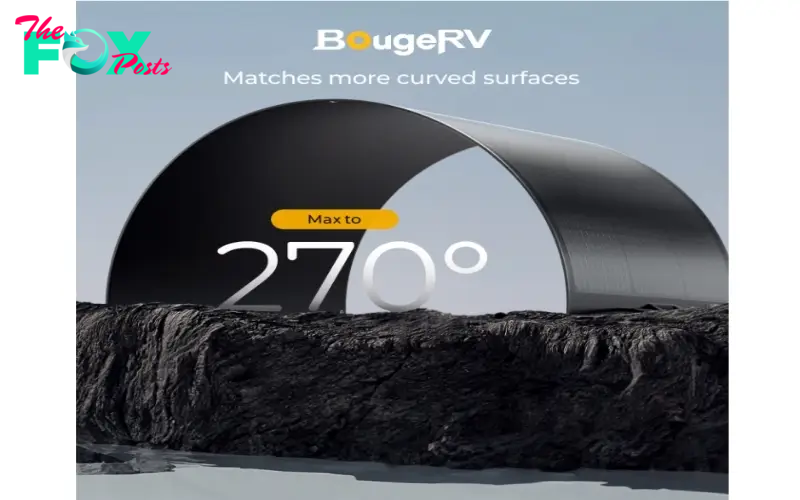In today’s world, renewable energy sources are playing a crucial role in reducing our dependence on fossil fuels and minimizing environmental impact. Among the many advancements in solar energy Technology, CIGS solar panels are gaining attention for their flexibility, efficiency, and sustainability. These panels offer a unique approach to solar energy generation, making them a versatile option for a wide range of applications, from residential rooftops to mobile energy solutions for RVs, boats, and remote locations.
This article explores the uses, importance, and key advantages of CIGS solar panels, helping you understand why they’re an excellent choice for those looking to harness the power of the sun.
What Are CIGS Solar Panels?
CIGS stands for Copper Indium Gallium Selenide, a semiconductor material used in thin-film solar panels. Unlike traditional silicon-based solar panels, CIGS panels are made by depositing layers of this semiconductor material onto a flexible substrate, such as plastic or metal foil. The result is a thin, lightweight, and flexible solar panel that can be easily installed in various environments where traditional rigid panels may not be practical.
CIGS solar panels are known for their ability to convert sunlight into electricity efficiently, even in low-light conditions. This makes them a popular choice for users who need reliable energy generation in less-than-ideal environments.
Key Features of CIGS Solar Panels
Before diving into the uses and importance of CIGS solar panels, it’s helpful to understand some of the key features that make them stand out:
- Flexibility: CIGS panels can bend and conform to curved surfaces, allowing them to be used in unique locations like vehicle rooftops, tents, or irregularly shaped roofs.
- Lightweight: Due to their thin-film construction, these panels are much lighter than traditional solar panels, making them easier to transport and install.
- Durability: CIGS solar panels are resistant to environmental factors like heat and moisture, ensuring long-term performance in outdoor settings.
- High Efficiency in Low Light: CIGS panels perform well in low-light conditions, such as cloudy weather or shaded areas, making them more versatile than some other types of solar panels.
Uses of CIGS Solar Panels
One of the main reasons why CIGS solar panels have become so popular is their versatility. These panels can be used in a wide range of applications, both large and small, making them suitable for different energy needs. Here are some of the most common uses:
1. Residential Rooftops and Buildings
CIGS solar panels are increasingly being used in residential solar power systems due to their flexibility and ability to integrate into various roof types. Whether you have a flat roof, a curved surface, or a structure with complex angles, CIGS panels can conform to these shapes and provide efficient energy generation.
Their lightweight nature also makes them ideal for rooftops that may not be able to support the weight of traditional solar panels. Homeowners looking to install solar power without modifying their roof’s structure may find CIGS solar panels to be a more practical solution. In addition, their ability to perform well in low-light conditions means that even in areas with less direct sunlight, CIGS panels can still generate substantial energy.
2. RVs, Boats, and Mobile Applications
For those who enjoy off-grid living, CIGS solar panels offer a reliable energy source while on the move. RVs, boats, and campers can greatly benefit from flexible solar panels because they can be easily installed on curved or irregular surfaces. Their lightweight design and portability make them perfect for mobile applications where weight and space are significant concerns.
Whether you’re parked at a campsite, sailing along the coast, or Traveling through remote areas, CIGS solar panels provide a steady supply of renewable energy. This allows you to power essential devices like lights, refrigerators, and communication equipment without relying on noisy generators or depleting limited fuel supplies.
3. Remote and Off-Grid Locations
In remote locations where access to electricity is limited or non-existent, CIGS solar panels are an excellent solution. Their durability and ability to perform in less-than-ideal conditions make them suitable for areas with challenging climates or inconsistent sunlight. In off-grid cabins, rural farms, or isolated research stations, these panels can generate enough energy to power lighting, appliances, and other essential systems.
CIGS solar panels can also be paired with battery storage systems, allowing users to store excess energy generated during the day for use at night or during cloudy periods. This ensures a continuous and reliable power supply, even in areas where sunlight is not always abundant.
4. Temporary and Portable Energy Solutions

Another significant advantage of CIGS solar panels is their portability, making them ideal for temporary setups or emergency situations. Because they are lightweight and flexible, they can be easily rolled up, transported, and deployed in minutes. This is particularly useful for disaster relief efforts, outdoor events, or construction sites where temporary power sources are needed.
In the event of an emergency, CIGS solar panels can provide critical power for communication devices, medical equipment, and lighting, helping to restore order and safety in difficult situations. Their ease of transport and quick setup make them a valuable resource in times of need.
The Importance of CIGS Solar Panels
As the world continues to shift towards renewable energy, the role of CIGS solar panels is becoming increasingly important. Here’s why:
1. Reducing Environmental Impact
CIGS solar panels offer a more sustainable way to generate electricity, reducing reliance on fossil fuels and lowering greenhouse gas emissions. Since these panels can be deployed in a wide range of environments, they help promote clean energy access in areas where traditional solar installations may not be possible.
The production process for CIGS panels also requires fewer raw materials and generates less waste compared to other types of solar panels, further enhancing their environmental benefits.
2. Expanding Solar Access
One of the key advantages of CIGS solar panels is their ability to expand access to solar energy. Their lightweight and flexible design allows them to be used in locations where traditional panels are not feasible, such as curved surfaces, mobile applications, and remote areas. This flexibility makes solar energy more accessible to people who live in diverse environments, from urban homeowners to rural off-grid dwellers.
By making solar energy more accessible, CIGS panels play a vital role in increasing the adoption of renewable energy and moving society towards a more sustainable future.
3. Enhancing Energy Security
In today’s world, energy security is a growing concern. With the unpredictable nature of fossil fuel markets and the risks associated with power grid failures, having a reliable and independent energy source is more critical than ever. CIGS solar panels offer a solution that enhances energy security by providing a decentralized and renewable power source that can operate in a variety of environments.
Whether used for homes, Businesses, or mobile applications, CIGS solar panels ensure that users have a consistent energy supply, even in the face of energy disruptions or natural disasters.
Conclusion
CIGS solar panels represent an exciting advancement in renewable energy Technology, offering flexibility, durability, and efficiency in a range of applications. From residential rooftops to mobile energy solutions, these panels provide a sustainable and reliable way to generate power in diverse environments. As the world continues to move towards renewable energy, the role of CIGS solar panels will only grow, helping to expand access to solar power and reduce environmental impact.
By choosing CIGS solar panels, individuals and Businesses can enjoy the benefits of clean, renewable energy while reducing their dependence on traditional fossil fuels. Whether you’re looking to power your home, RV, boat, or remote cabin, these panels offer a versatile and efficient solution for all your energy needs.








































